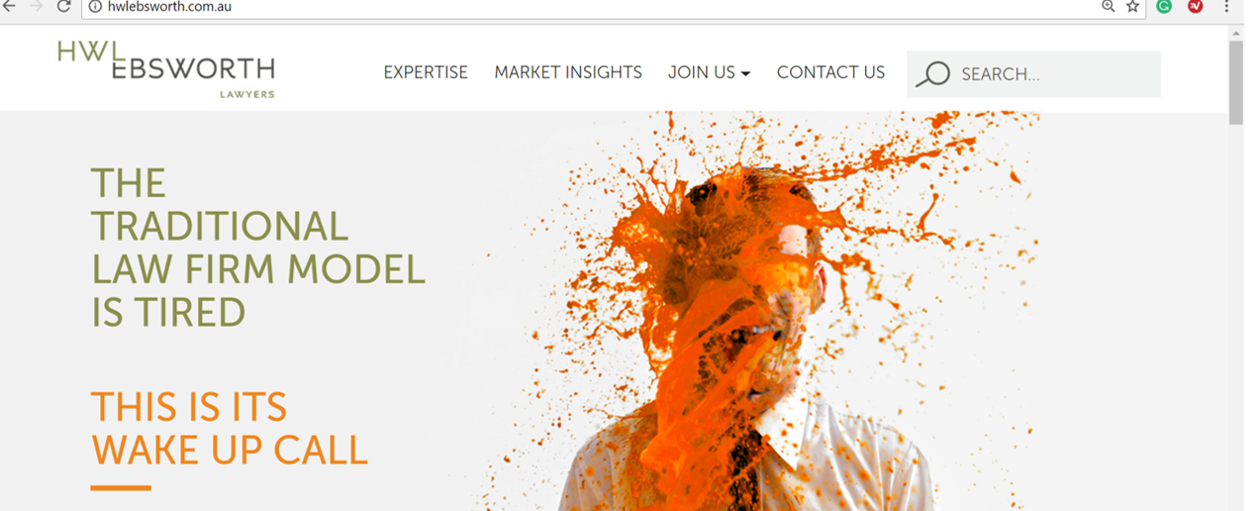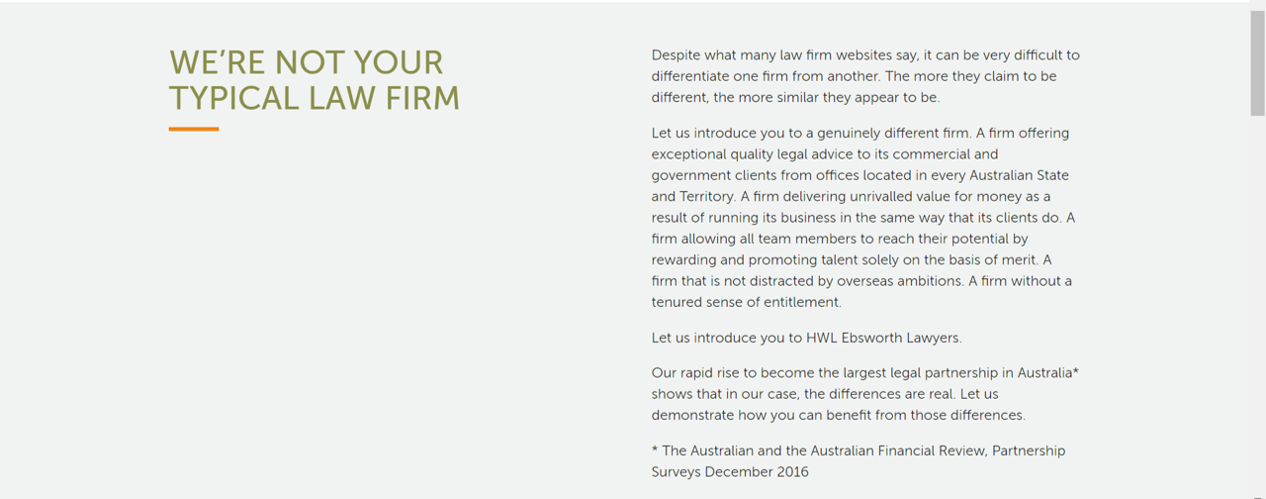Why is it so difficult for law firms to articulate their point of difference? Perhaps because most don’t have one.
Or because they don’t really know what sets them apart.
Or because they don’t understand why it’s important to differentiate.
Or because they’re afraid to commit.
Recently, I stumbled upon the new website of Australian law firm HWL Ebsworth. Under the headline ‘We’re not your typical law firm’, HWL attempts to convey what makes it different.
Unfortunately, in so doing, HWL shows itself to be just the same as virtually every other law firm.

 Same, same but…just the same
Same, same but…just the same
HWL is correct about one thing:
“Despite what many law firm websites say, it can be very difficult to differentiate one firm from another. The more they claim to be different, the more similar they appear to be.”
Based on HWL’s website, the firm’s stated points of difference mostly aren’t.
Offering exceptional quality legal advice to commercial and government clients makes HWL the same as every other commercial law firm. It’s not a point of difference.
Likewise, in an era when clients are abandoning traditional law firms in favour of ‘new law’ alternatives, it’s almost passé to play the national footprint card. Even if geographic location is still relevant, scores of firms have offices across Australia. It’s not a point of difference.
That HWL rewards and promotes on the basis of merit is not a point of difference. It’s to be expected.
‘A firm without a tenured sense of entitlement’ suggests HWL has abandoned the lockstep partnership model but so too have others. Is it a point of difference? No, it’s a remuneration decision.
‘A firm that is not distracted by overseas ambitions’ reads like a swipe at its competitors. How is it a point of difference? Why should it matter to clients?
Get to the point
Every law firm needs a clear, compelling and ideally differentiated positioning strategy. It’s how clients distinguish one firm from another.
Understand also, that if you don’t own and articulate what makes you different your clients and prospects will draw their own conclusions.
If you don’t own and articulate what makes you different your clients and prospects will draw their own conclusions.
Importantly, a point of difference must be real and relevant and able to be evidenced.
- What sets you apart from your competitors?
- Is it valuable to your target market?
- How can you prove it?
- How can you protect it?
There are many ways a law firm might differentiate itself: innovation, industry focus, legal services, expertise, pricing, delivery method…
For example, DLA Piper differentiates itself by being a corporate responsibility leader, particularly via its pro bono commitment.
Maurice Blackburn distinguishes itself by doing only plaintiff work.
PWC Legal stands out because its legal services are integrated with transaction services such as risk assurance, strategy and consulting, and tax.
HWL could argue a point of difference is that it has the largest number of partners of any firm in Australia. That’s true – at least until the next merger – but is it relevant and valuable to clients? Probably not.
First impressions matter
Having done my own research, it does seem HWL’s strategy might be to differentiate on price and the value for money its thrifty style of management affords its clients. Around the time of its merger with TressCox, HWL’s CEO spoke to the Australian Financial Review about his firm’s “aggressive approach to delivering value”, how it keeps a tight rein on operating costs and overheads, and how it has not increased its hourly rates in ten years.
To capitalise on what makes it different, HWL should rethink its messaging. The statement, ‘A firm delivering unrivalled value for money as a result of running its business in the same way that its clients do’ does not communicate the firm’s singular point of difference in a clear and compelling way. It’s awkward, ambiguous. Additionally, the point is diluted by the redundant messages that surround it.
It will take HWL more than a coat of paint (or a can of paint, in this case) to convince me that it’s not your typical law firm.
What Market Expertise‘s point of difference? We are the only B2B marketing agency to focus solely on services and intangible products.
If you like what we have to say, and how we say it, follow Market Expertise on LinkedIn and on Twitter.



 Same, same but…just the same
Same, same but…just the same


